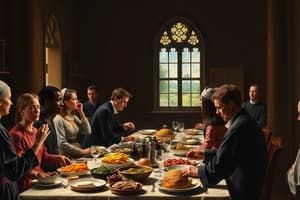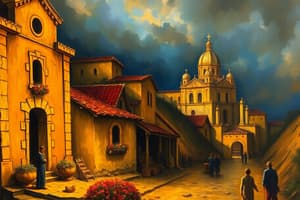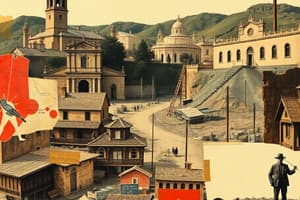Podcast
Questions and Answers
What does the text imply about the role of the church in colonial society?
What does the text imply about the role of the church in colonial society?
- The church had no influence on personal lives.
- The church was a moral and spiritual authority. (correct)
- The church was against all forms of government.
- The church was primarily a social institution.
The church had no impact on the relationships with Native Americans.
The church had no impact on the relationships with Native Americans.
False (B)
What was the consequence mentioned for violating the publishing rules?
What was the consequence mentioned for violating the publishing rules?
Violators will be prosecuted.
The colonial church was a significant _______ authority in the community.
The colonial church was a significant _______ authority in the community.
Match the following statements about the church's role in colonial America:
Match the following statements about the church's role in colonial America:
Which of the following best describes how colonial churches influenced personal lives?
Which of the following best describes how colonial churches influenced personal lives?
Church organizations were considered a minor aspect of community life.
Church organizations were considered a minor aspect of community life.
The church was often at odds with _______ interests in colonial times.
The church was often at odds with _______ interests in colonial times.
In which year did the bishop arrive in the city of Mexico?
In which year did the bishop arrive in the city of Mexico?
The legend about the Virgin Mary commanded the construction of a temple in her honor.
The legend about the Virgin Mary commanded the construction of a temple in her honor.
What role did Zumárraga have in Mexico?
What role did Zumárraga have in Mexico?
The campaign in the eighteenth century authorized the Virgin's __________ features.
The campaign in the eighteenth century authorized the Virgin's __________ features.
Match the following events with their significance:
Match the following events with their significance:
What was a significant event that occurred in the mid-sixteenth century regarding the Virgin?
What was a significant event that occurred in the mid-sixteenth century regarding the Virgin?
The bishop had no influence on the decisions made in Mexico.
The bishop had no influence on the decisions made in Mexico.
Flashcards
Age of Exploration
Age of Exploration
The period when the European powers were beginning to explore, colonize, and trade with the Americas.
Christianization of the Americas
Christianization of the Americas
A religious and historical period marked by the spread of Christianity throughout the Americas.
Cultural Transformation
Cultural Transformation
A significant process in which indigenous cultures and societies in the Americas were influenced and often forcibly changed by European arrival.
Cultural Syncretism
Cultural Syncretism
Signup and view all the flashcards
Assimilation
Assimilation
Signup and view all the flashcards
Forced Conversion
Forced Conversion
Signup and view all the flashcards
Cultural Suppression
Cultural Suppression
Signup and view all the flashcards
The Church's Influence in Colonial Life
The Church's Influence in Colonial Life
Signup and view all the flashcards
The Church as a Central Institution
The Church as a Central Institution
Signup and view all the flashcards
The Church as a Community Center
The Church as a Community Center
Signup and view all the flashcards
Missionary Efforts in the New World
Missionary Efforts in the New World
Signup and view all the flashcards
The Colonists' Goal of a Christian Society
The Colonists' Goal of a Christian Society
Signup and view all the flashcards
The Church and Education
The Church and Education
Signup and view all the flashcards
Conflicts over Religious Beliefs with Native Americans
Conflicts over Religious Beliefs with Native Americans
Signup and view all the flashcards
Religion's Impact on Colonial Culture
Religion's Impact on Colonial Culture
Signup and view all the flashcards
Study Notes
Colonial Church
- Colonial travellers often saw bell towers and heard bells, indicating the prominence of the church
- The church was deeply ingrained in colonial culture, influencing various aspects
- The Spanish crown had exceptional privileges granted by the papacy, effectively controlling the church
- This patronage created a close tie between the church and the state
- Church organization had two main branches, secular and regular clergy
- Secular clergy comprised priests serving under bishops; regular clergy included missionaries overseen by religious order superiors (e.g., Franciscans, Dominicans)
- Missions were justified by a Christian mission to save souls
- The desire for status and wealth also fuelled the Spanish conquest
- Religious fervor was demonstrated by figures like Cortés, who urged abandoning indigenous gods and idols, often challenging the safety of those involved
- 1527, a Dominican, Julián Garcés, became the first bishop in Tlaxcala, and Juan de Zumárraga followed as bishop in Mexico City in 1528
- Zumárraga, a Franciscan, was a significant figure due to his role as protector of the Indians and his efforts to ease the suffering of the Native people. He worked to alleviate any issues that rose.
Church Organization
- Secular clergy served under their bishops
- Regular clergy were missionaries under religious order superiors
- Diverse orders included Franciscans, Dominicans, and Augustinians, amongst other orders
- Their motivation involved status, wealth, and the desire to save souls, justifying the conquests
Religious Conquest
- Missions began with requests for missionaries
- 1523: Franciscan friars arrived in Veracruz
- 1525: Dominican order followed
- 1533: Arrival of the Augustinians
- Significant figures include Pedro de Gante and Toribio de Benavente (Motolinía)
- Orders prospered quickly, with notable expansions by 1559
- Franciscans had 380 members, Dominicans 210, and Augustinians 212
- Motolinía claimed approximately 9 million Indians were baptized (possibly exaggerated)
Religious Disputes
- Disputes arose between ecclesiastics and civil authorities, including archbishops and viceroys
- Conflicts often involved wealth and power, particularly between the Jesuits and bishops
- Some clerics faced discrimination based on their birth
- Higher positions often favored those of Spanish descent
- The church amassed wealth through extensive property ownership and lending
- Church wealth significantly invested in opulent places of worship
- The Church frequently intervened in disputes and often had the final say.
Colonial Piety
- Indigenous religions blended with Catholicism
- Local deities fused with Catholic saints (e.g., Saint James, Virgin Mary)
- Christian imagery (e.g., Crucifixion) appropriated in new contexts
- Local customs and rituals continued
- Religious practices adjusted and adapted to local needs
- Church structures became significant features of the social landscape
- 12,000 churches built
The Inquisition
- Established in 1571
- Stemmed from efforts to maintain religious orthodoxy and social conformity
- Targeted heretics, especially conversos and crypto-Jews
- Investigated heresy and magical/superstitious practices
- Maintained religious unity
- Officials exercised various punishments, including floggings and public humiliations
- Focused on a range of issues, including sexual offenses, bigamy, and heresy
- Cases reflected religious diversity and social dynamics
Studying That Suits You
Use AI to generate personalized quizzes and flashcards to suit your learning preferences.
Related Documents
Description
Explore the intricate relationship between the Colonial Church and state during the colonial era. This quiz covers topics such as the role of secular and regular clergy, the church's influence on culture, and the interplay with the Spanish crown. Test your knowledge on key figures and events that shaped the church's power and mission.




